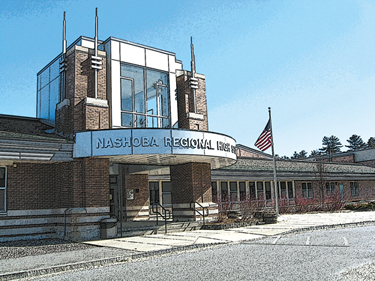
By Ann Needle
At the latest Nashoba Space Task Force meeting, members continued to wrestle with the question of what type of data they need to help address Nashoba Regional High School’s apparent space shortage.
At this December 18 meeting, NRHS Principal Dr. Parry Graham presented a draft of a “needs summary,” outlining the space challenges faced by each NRHS department. These ranged from the well-known issues with outdated lab space for the Science classes, to Theater Arts classes forced to share auditorium space with Nashoba Drama play rehearsals and equipment.
Meanwhile, NRHS administration continued to stress that it is trying to meet student needs through any available route. Graham said that, when a faculty member has requested adding a new class to the curriculum, “In the past two and a half years, I have tried to not start my answer with ‘we don’t have the space.’” He noted that the average number of students not getting one or more classes they requested is under 10%.
But, issues still come up, Graham stressed. “I would love to add another Business teacher, but I don’t know where I would put them, I just don’t know.” He reiterated from past meetings that the state recommends high schools keep their spaces down to 80-85% utilization, while Nashoba is at 93%.
NRHS Director of Guidance Jodi Specht agreed that the space crunch at the school impacts the diversity of courses offered. She reported that, of the 130 students requesting the Introduction to Business course, 74 were shut out.
While the core subjects — especially Science — are the focus of carving out or adding more space, Specht commented that having a diversity of programs to offer is vital to the school’s mission. “Remember, what dictates this is we do not have a vanilla program. Many of our kids are serious musicians, or are serious artists.”
Driven by the Core
Lack of space for those core classes makes it tough for some students to diversify their schedules. For instance, Graham explained that AP Biology has conflicted with Band on the schedule for years, forcing an obvious choice for the serious Science student usually taking AP Bio.
To help eke out a few more options for these students, Graham said the school will convert one of its sophomore Biology classes into an Honors-level course. As with AP Bio, Honors will offer 5 credits, which reflects extra lab time (other Bio classes offer 4 credits).
Graham said he also would like to add more academic support courses, such as the new Math Foundations class that students needing extra help in the subject take alongside their regular Math courses. Stow School Committee Rep. Lynn Colletti suggested holding some of these courses in the summer, though Graham replied that the students needing this help are not likely to attend summer courses.
Superintendent Michael Wood agreed with comments throughout the Task Force that the next step would be taking these facts and prioritizing what needs to be preserved or added in the curriculum — and the potential number of classrooms ideally needed — before outlining estimated costs for different building options.
Considering the amount of information not yet determined, Task Force Member Mark Jones of Stow remarked, “Until I understand the choices, I can’t be your advocate. I want to be your advocate.”
The next Task Force meeting is scheduled for January 22.